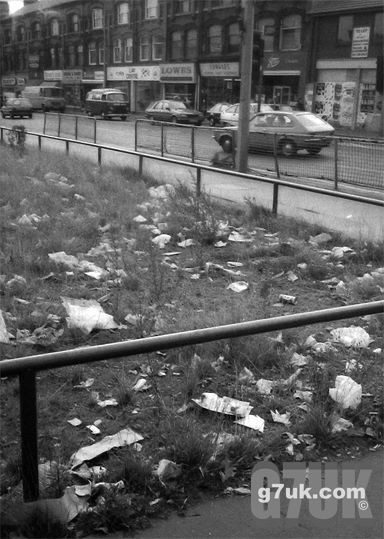Depending on who you believe, and what is included, the UK national debt is somewhere between £800 billion and £4.8 trillion (which is £4,800 billion).
The Office for National Statistics (ONS) estimates that the total debt, excluding bank bail-outs, is £816bn. But this figure doesn’t include the state’s pension liabilities, in a contravention of standard accounting practices.
The Institute of Economic Affairs (a free market think tank) calculates that the national debt is £4.8 trillion, once state and public sector pension liabilities and the cost of the bank bail-out are included, or £78,000 for every person in the UK. Channel 4’s recent programme — ‘Britain’s Trillian Pound Horror Story‘ — was based around this much larger figure.
According to the National Audit Office, the bank bail-out is estimated to have cost £850bn. We may get some or all of this back eventually, maybe even make a profit on the loans, but nobody knows when.
The UK’s deficit for 2010 is about £178bn. This is the shortfall between the income the government has and what it spends. Of course a lot of money is now being spent paying interest on the debt.
Everyone used to think that the money the US and Canada loaned us in 1945 and 1946, after World War II, was a large amount. We only finished paying it off at the end of 2006. But that was just £2.81bn which, adjusted for inflation, was equal to £77.75bn in 2006. Even the lowest estimate of our current national debt is around ten times that.
However if you look at the national debt as a percentage of Gross Domestic Product (the amount of goods and services produced in a year) the current figure is nowhere near as high as it has been sometimes in the past.
I suppose the question is how well-equipped Britain is to produce goods and services in the future compared to the days when it was a manufacturing and industrial powerhouse? Or, more recently, a financial centre in a property and credit bubble.
The ‘no cuts’ protesters claim that cuts in the public sector will be ‘devastating’. But what they never mention is how much spending has increased in real terms in some areas over the past decade.
According to Channel 4 News spending by local government in England, Wales and Scotland has ‘risen 84 per cent in the past ten years, to over £160bn a year‘. There’s a chart showing public spending here.
Inflation over the same period was about 30%. So in real-terms spending has increased by an incredible 54% since 2000. Now, the coalition government plans to reduce it by 28% over the next five years.
Of course, five years of inflation from 2010-2015 needs to be deducted too. But even if inflation is much higher than it has been recently — say 5% a year over that period — it means that, in real terms, spending has just gone back to what it was in 2000.
This is what the ‘no cuts’ people are complaining about in some instances. They are campaigning to keep the increased public spending that has taken place over the past decade.
I would never downplay the impact on an individual who loses their job. But, strangely, I don’t remember public services themselves being in a state of ‘devastation’ back in 2000. Everything was working perfectly well. And here’s a question… Do you feel you’ve seen evidence of 54% more money being spent on core council services? I don’t. Are libraries, parks, roads and bin collections 54% better that they were back in 2000?
So where has the money gone? Some of it on less-important, frivolous things that perhaps we don’t really need. For example, The Mule reports that:
‘Since 2004, Manchester City Council has provided Marketing Manchester with £1,081,187 in funding and a further £2,610,000 in “subvention grants”‘.
Marketing Manchester is the tourist board and is behind Manchester Pride too.
And some of it has been due to incompetence… Manchester City Council accidentally paid Marketing Manchester £421,000 in recent years because of a basic accounting mistake. Generously, it decided not to reclaim any of this sum, which works out at almost £1 for every single person in the City of Manchester or several pounds for every long-suffering Council Tax payer.
In 2007, Manchester City Council gave more than £2m to the International Festival. And then there are all the jobs that probably wouldn’t have existed 30 years ago: despite making plans to get rid of 900 staff, and a promise to only recruit staff who are absolutely essential, the Council has advertised no less than three ‘communications’ vacancies in the past month. One of which the media describes as a ‘Twitter czar’.
If any of these things actually brought in more for Council Tax payers than they cost, then that would make sense. But I suspect they don’t. In fact I reckon you only need to look at Manchester Pride to get a sense of what is going on more widely: the public fund something (through buying tickets in the case of Pride) and businesses run off with giant profits.
Someone has to pay for this extra spending and the extra jobs. Right now I don’t have figures for Manchester. But in neighbouring Salford, Council Tax bills have increased by 78% since Labour took office in 1997. Over the same period, inflation was about 39%. So Council Tax bills have increased by almost 40% in real terms. A terrible burden on everyone who has to pay all or part of the bill: including many pensioners and low-paid people.
Again, do residents in Salford feel they have benefited from a 40% improvement in core council services? I wonder…
As they binged on easy credit, money from re-mortgaged properties and kidded themselves about how much richer they were each day because of rising house prices, many people didn’t notice all kinds of bills being sneaked upwards at a rate that far outstripped inflation and wages.
But the property bubble has burst and the flow of credit has been turned off. Most of us can’t afford to continue paying 40% more Council Tax in real terms than we did 13 years ago. Especially when all kinds of other things are rising, such as fuel and food bills, with an increase in VAT to 20% due early next year.
Some protesters suggest that the rich should have their wealth taken away to go towards the national debt. I’m in favour of the rich paying their share. But you could take every penny owned by the top 1,000 richest people in Britain and the total would be £335.5bn — which is not quite enough to pay the deficit for two years (a figure of £356bn) and with no effect whatsoever on the existing debt.
Something I do fully support is a crackdown on rich people who avoid paying tax through offshore arrangements and the like.
What worries me is that arrogant local politicians will decide to continue to fund the unnecessary things, while cutting back on essential core services. This is the key issue in all of this. Some may even do it for political advantage.
Manchester City Council has past history of doing precisely that. In the mid-1980’s some streets were litter-strewn because the (at that time) left-wing Labour council decided it would cut back on street cleaning and other public services and facilities that benefited everyone rather than on its pet projects. On a visit, Michael Hesseltine described one street in Manchester as the dirtiest in Britain.

As part of its confrontational attitude towards the Thatcher government in the 1980’s, Manchester City Council chose to neglect its primary functions — such as cleaning the streets — and spend money on more obscure minority causes instead. As a result, many parts of Manchester looked like this: the litter-strewn corner of Stockport Road and Stanley Grove, seen here in October 1986. Considering some of the sinister things that New Labour did while in office and, more recently, the election campaign by Phil Woolas, to what lengths would a Labour council go to today to prove an anti-Tory point and defend its pet projects?
The grade II listed Victoria Baths in Longsight was just one casualty of this policy. It closed in 1993 and has never reopened.
Whereas back in the eighties the chosen causes involved gay men, lesbians and black and ethnic minorities — which some of us may consider were a worthy cause at that point in time — today it’s all about filtering public money out to help big business and marketing chums, with lots of spending on PR and vanity projects such as expensive full-colour brochures about how great the council is doing and why your local PFI project still hasn’t happened.
SCARE TACTICS
What the ‘no cuts’ people rarely mention is that Labour was in power for 13 years and is mainly to blame for the current situation. Spending on the public sector was fuelled by borrowing and the property bubble. Both of which are now at an end. So spending must go back to about what it was before the boom.
Many on the left specialise in scare tactics. We saw this throughout the New Labour years when there was supposedly a paedophile or terrorist on every corner. But Tony Blair, David Blunkett and friends would protect us with a new law, further crackdown on our civil liberties or an extra CCTV camera.

In the months leading up to the general election earlier this year the hysteria reached fever pitch. I’m not saying that some people weren’t genuine in their motives. But, to some of us, it began to look as if the more unsubtle activity was being driven by Labour out of self-interest. In other words, to frighten people into voting for them.
On the Pink News website, numerous comments suggested that, if the Tories won the election, gay rights would be rolled back to the 1980’s almost overnight — back to the days of Section 28.
There was Hope Not Hate warning us of the dangers of the BNP, shrill students on Facebook insisting that people couldn’t ‘be allowed’ to vote BNP (so democratic of them) and no event was too sensitive to be hijacked for party-political gain. As proved by Manchester Labour councillor Paul Fairweather who used the 2009 Manchester Pride HIV Vigil for an opportunist rant — again about the dangers of the BNP.
There were no depths to which Labour politicians would not stoop when it came to trying to scare the electorate. As shown by the case of Phil Woolas who has just been kicked out of the Oldham East and Saddleworth seat that he clung onto back in May.
Regular readers may recall that I highlighted a positively glowing article that the LGF wrote about Mr Woolas (one of their patrons) back in June 2009. Considering his actions as Minister of State for Borders and Immigration the uncritical coverage seemed a bit peculiar and I smelt a rat.
The rumour at the time was that Mr Woolas had been at university with someone from the LGF and this might be a bit of a favour for an old pal who could benefit from a few much-needed votes from the LGBT community. Indeed, at the General Election earlier this year, he only won the seat by 103 votes.
Now that it’s been found that Woolas cynically exploited racial tension in an attempt to shore up his vote, the article seems even more hollow.
So in this context now we have the ‘devastating’ cuts in public services. Some of the people behind this campaign are happy to scare the old and vulnerable purely for political purposes. Even though, five years from now, spending in some areas will very likely be the same or even higher in real terms than it was back in 2000. While spending on other areas, such as on the NHS, has been ringfenced.
Of course if you’re a public sector union, unlucky employee or someone who longs to relive the poll tax riot of 1990 it’s much easier to blame the Tories, than face up to the real issues and truth of the situation. There’s a moment in an old comedy show from 30 years ago — I can’t remember if it’s The Young Ones or Not the Nine O’Clock News. But a youth being interviewed is only allowed to say “yeah Tories innit?” before the microphone is taken away. That’s how a lot of the ‘no cuts’ debate seems to me: superficial and fundamentalist.
If we really want to make a difference we should focus on holding politicians, public services and local councils to account and make sure the available money (after cuts) is spent on important things: home helps for the elderly rather than Twitter czars and highly-paid executives.


1 Comment
Possibly the most sensible post that I’ve heard on this topic for a long time.